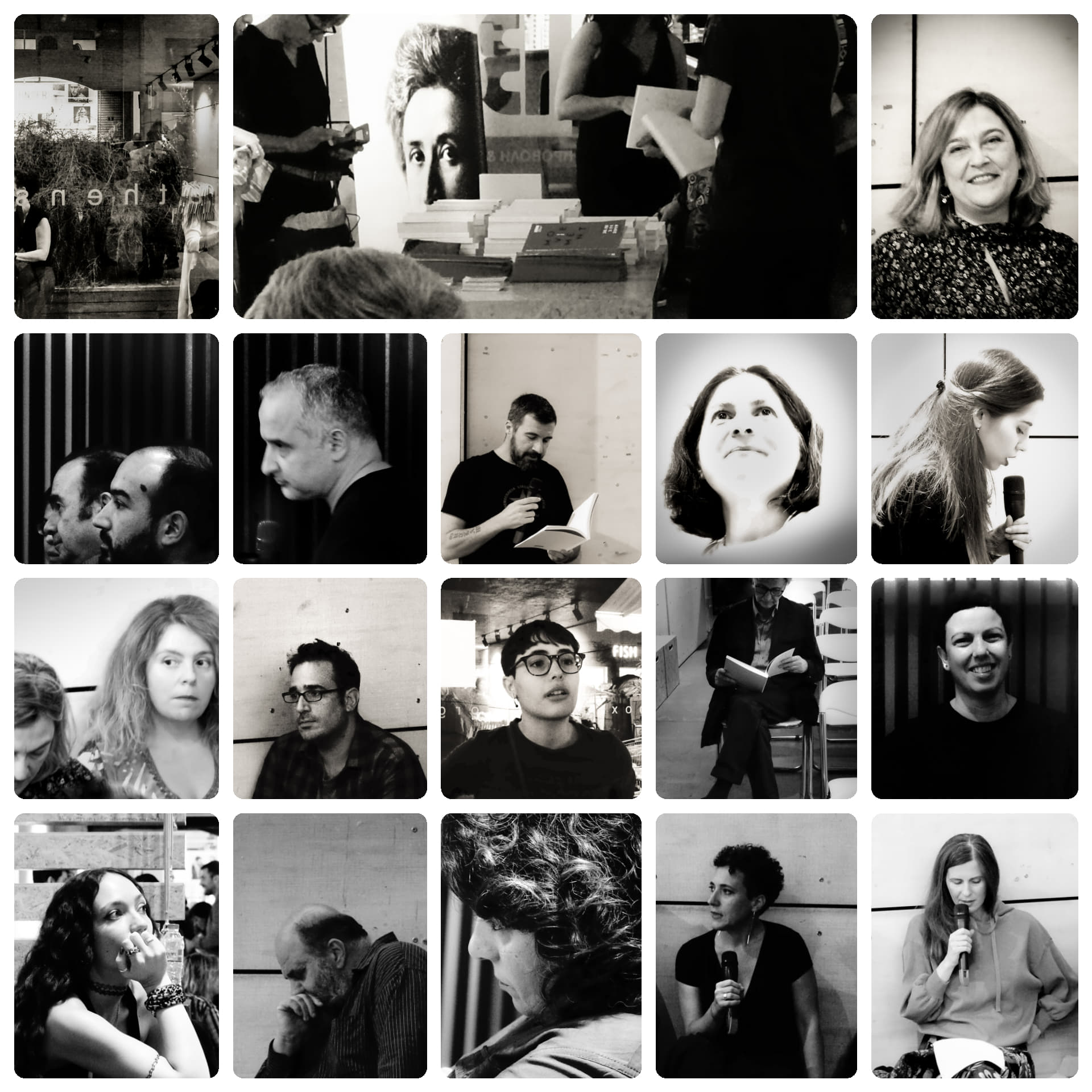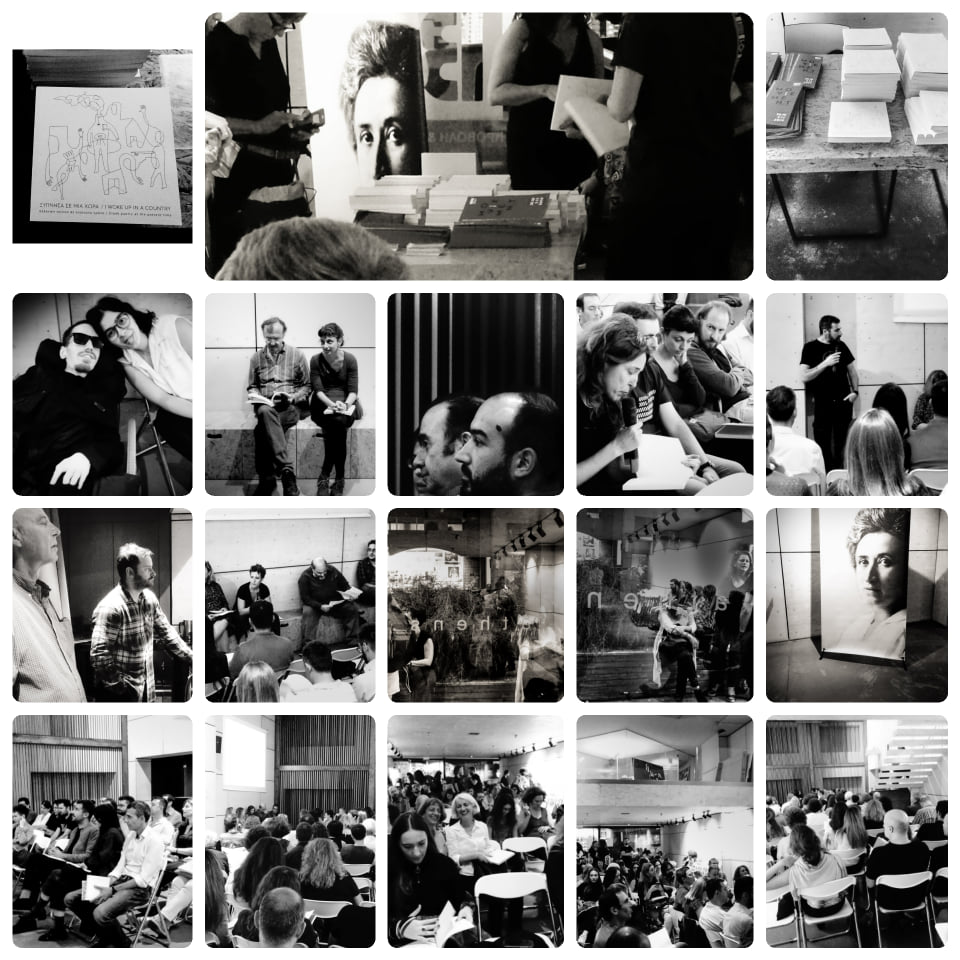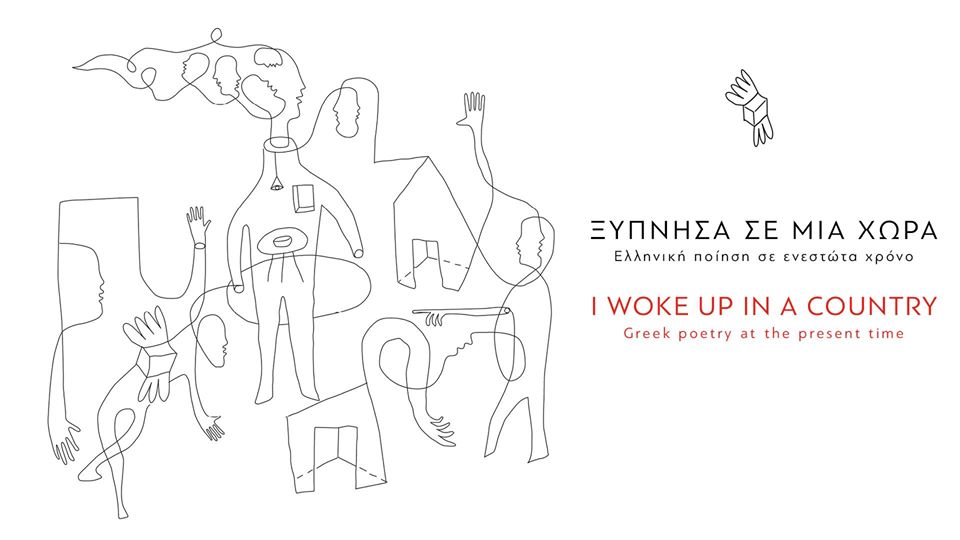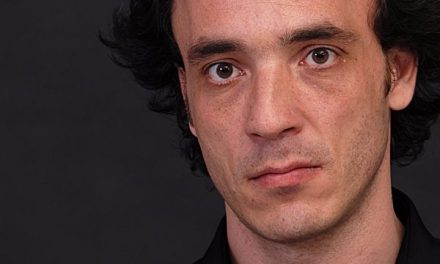I woke up in a country: Greek poetry at the present time is a recently published bilingual poetry anthology featuring fifty Greek poets, half men half women, up to the age of forty five. A joint effort of Mania Meziti, Eirini Margariti and Fanis Papageorgiou, the anthology “attempts to chart the area of personal experience of people living and writing poetry in a crucial era. A bilingual anthology that tries to describe personal experience through the power of verbal journeys, by imprinting aesthetical, stylistic and thematic tendencies – provided that they exist, seeking a community within speech, provided that it exists as well”. The poems were written in Greek and have been translated in English by Christiana Mygdali in the expectation of them travelling farther away.
The editorial team spoke Reading Greece* about how the idea of the anthology came up, the criteria upon which the selection of the poems was based, as well as about the main themes the poems delve into. They also discuss the relationship of poetry to the world it inhabits, while they comment on the challenges of integrating Greek literature in the international field and whether bilingual anthologies can contribute to this end.
I woke up in a country Greek poetry at the present time was recently published and presented to the Greek audience. Tell us a few things about the book.
M. We made the proposal to Rosa Luxemburg Stiftung (Office in Greece), which has a long history of notable social and political publications, hoping that poetry could also fit in its publishing program. Our proposal was accepted, so we started working on choosing, translating and putting the anthology together. The book was the result of an open call announced in various sites and addressed to poets up to forty five years of age. Our aim was to record the experiences of people in their most productive age, during a historically crucial period; to put on paper what interests them, what became their focus of attention, the way they perceive the world around them. The anthology comprises fifty poems, half written by men and half by women, since we strongly believe in equal chances.
EI. For me, the anthology constitutes a meeting point. A common ground, which comprises our wish for creative co-existence. It is a collective attempt to answer the crucial question: which is the common ground that we all share and which are the new ways of expression we can explore at this specific time.
F. Every anthology when published gives substance to the anthologized poets by a common denominator which is spatial, temporal, ancestral, and finally, intersubjective and intertextual. It is a chance to seek for universal categories of “homology” between the anthologized, instead of an obsessive confirmation of the “uniqueness” of the poetic subject. Thus, the primary processes of reduction produce universal categories on the basis of which the poets who reveal similar or identical characteristics are classified (Jameson 2002, p. 64). This anthology is born as an attempt to retain all the contradictory elements and the intrinsic radical tensions into the context of unity of unified thought or language. Under that vein, the anthology becomes common vehicle, meeting point and unifying project for an age category.
How did the idea of the anthology come up? On which criteria was the selection of the poems in the book based? Which are the main themes these poems delve into?
F. The idea of the anthology came up in terms of contemporary practice; there have been numerous events of reading, either extrovert or introvert among this age category and also the issue at stake – that of a common denominator of this age category – has been heavily discussed among the three of us and among these events. Criteria for the selection of the poems were their aesthetic power and the contextual closeness to the substance of the Modern Greek era, i.e. the crisis. For that reason, the call for submission included a summary of what is to be found as inspiration of the poems. The main themes of the poems are the references to a more “vivid” past that referred to society or to social movements, an idealized past that appears as a loss; the references to social movements, notions as social struggle and imaginary or actual subordination to working classes. Also, at times, the poem can take gender characteristics in search of identity, against the gender violence and oppression or it can encounter with notions such as motherland or migration under the general question “who am I and where do I belong to.”
Μ. The idea of the anthology came out of our belief that poetry holds the power to conceive and, through language, depict, interpret and judge the spirit and the atmosphere of an era without appearing outmoded. The results may not be immediately discernible, yet, in the long run, poetry has the power to intervene and maybe to cause shifts. The criteria based on which we chose the poems are obviously subjective and were dictated by the material we had in our hands as well as our taste as anthologists. As Elliot eloquently put it, if you ask ten different people to tell you who, in their opinion, are the best poets, you would receive ten different lists. The poems revolve around various themes: historical developments, social exclusion, identity, gender, love, norms, diversity. There are also numerous poems referring to silence as an inability towards the sorrow of the other.
EI. I reckon that the idea for the anthology came up mainly as the natural continuity of the mapping of the poetic network undertaken by Mania Meziti in poets.gr, which by following the literary production of the last crucial years, could also detect its existential core. As for the criteria and the themes, I agree with Fanis and Mania, adding the dimension of personal as political, as well as a pervading sense of awkwardness towards the present and the future, which seems to permeate almost all the poems that were chosen.
 @Valia Gentsou
@Valia Gentsou
“In a world that idolizes the unique and the individual, the coexistence of fifty poets in an anthology could be considered as a political act… A bilingual anthology, that tries to describe personal experience through the power of verbal journeys, by imprinting aesthetical, stylistic and thematic tendencies – provided that they exist, seeking a community within speech, provided that it exists as well”. Tell us more.
ΕΙ. The contemporary self-centered individual is more exposed and vulnerable than ever. In contrast, a sense of belonging and social acceptance constitute the only conditions conducive to happiness. An anthology, even at a symbolic level, can offer just that: a safe framework of existence and creation against our insecure and lonely present. And this, in my opinion, constitutes its political nature, since it prompts us to share, co-exist and put together a common substantial discourse.
F. As already mentioned, putting together fifty male and female poets is an act of resistance against the search for the “uniqueness” of the poetic subject. And of course it constitutes a political act, a question, since we should first address the notion of political. As far as I am concerned, everything that stands against the bourgeois post-modern notion of “uniqueness” is highly political. Thus, I consider the search for “community” of pivotal importance.
What is the relationship of poetry to the world it inhabits? What does it mean for poetry to be political or a-political in times of crisis? Can poetry actually offer new ways to imagine what can be radically different realities?
F. For Marcuse, Art is a phenomenon deeply rooted in society, while an artistic work forms part of a social entirety (Marcuse 1973, p. 108); In addition, Burger (1984, p. 33) considers that every individual work is conceived and intertwined to social reality, to which it owes its creation as part of a dialectical relationship, while for Calas, the social, historical and moral dimensions of being, inevitably leave their mark on art. Everyday life and biotic practice make up the compulsion of the situation to which the artist is subjected. Of course, this function is not a linear relation of cause and effect but comes up as a vector sum of forces such as the situation and the intention. During periods of crisis, this dialectical relation tends to sharpen the political spirit and propensity of poetry. In any case, among the aims of the anthology was to find the traces of the crisis into the community, and in that sense someone could accuse us for biasness. On the other hand, poetry can be part of a “project for hegemony”. In that spirit, poetry can work towards the building of a subject who can understand, signify and act not-rationally, in the ultra positivistic way. At the same time, it can work towards the enlargement of the world’s conceptualization. However artistic “activity, for him indeed who has chosen it, proves insufficient at the decisive hours — those hours that ring every hour — when “the poet must complete his message by renouncing himself” (Blanchot 2017, p. 213). Given that art encounters action, direct and urgent action can only disserve it and art can only disserve itself (Blanchot 2017, p. 213).
M. As already said, poetry’s contribution seems to be a long-term one. As with dreams, in a symbolic and undecipherable language, within a secure and emotionally genuine environment, it helps us delve into memory and experiences. Without opposing a militant poetry and social realism, I believe that whoever wishes to write in order to dictate or form consciences, should be more than cautious. History has proven that a poetry who tried – explicitly rather than implicitly – to make us imagine of different realities, was strongly derided, maybe because it availed of an ideological sufficiency but not of the necessary depth. Poetry should have nothing to prove, except to its own self. In it manages to do something more than that, then it’s really remarkable.
ΕΙ. In my opinion, there are two distinct paths for poetry: either to face the world it describes in a confrontational way or to inhabit the world in a conciliatory way. I reckon that in this specific point in time, it’s the latter that could feature its political character. There is a confrontational discourse at all levels, yet the true need of our era is to reconcile the contradictions of our time so that a new landscape may arise. Only in this framework can poetry offer an open proposal to the world, regardless of how utopian this proposal would be.
How do you respond to those that talk about a “Greek poetry of the crisis” and “a new generation of Greek poets” that in a way resembles the generation of the 1930s?
F. I would answer in the terms offered by Lambropoulos, who argues that this age category constitutes a “memorable literal phenomenon” and more precisely an “endeavor of cultural autonomy” autonomy from the institutions (Lambropoulos 2017, p. 6). The script of that age category is articulated through “paradoxes” such as irregular rhythm, speech tempo, miscellaneous vocabulary, labyrinth-like syntax, internal rhyme, unrestrained intertextuality, aggregate lists that break sharply, undermining of stylistic features (Lambropoulos 2017, p. 5).
Μ. Although I reckon it’s too early to draw any secure scientific conclusions (in my opinion the evaluation and study of such parameters belong to literary historians, who certainly need time to evaluate what is happening – if this is indeed the case), I believe that a potential resemblance to the 30s generation lies in the intense presence of poetry in contemporary literature. If we are indeed witnessing the creation of ‘a new generation of Greek poets’, it has all started with the millennials, that is the first generation which is quite familiar with the digital world and the social media. That’s where I would integrate the poets of the crisis.
 @Valia Gentsou
@Valia Gentsou
As Vassilis Lambropoulos notes “of all the arts, poetry has been identified as the most representative of the current national crisis. It constitutes the major cultural domain where the Greek emergency and/or exception are being negotiated”. Does poetry constitute a way to talk about the present?
Μ. In case we agree with Hegel the man is merely an instrument of an era’s zeitgeist, and that the work of the individual man is prepared and determined independently of his will, then yes, poetry is nothing but a means in which the spirit of the era is expressed.
It seems that Greek writers who live in Greece have played no role in the so-called “world republic of letters”. Yet a promising development is that in recent years Greek poets and novelists have been circulating all over the world. Is there a way for the challenges of integrating Greek literature in the international field to be met? Can bilingual anthologies as yours contribute to this end?
M. Of course, Greek writers don’t play a major role in world literature. Greek poets write in Greek, and Greek is not English. English literature has the advantage of lingua franca. I believe that in a world where the English language is predominant, our domestic literature owes to be translated in English. It is the only means to be known. It doesn’t matter what you write, it matters in which language you write it. In this sense, I believe that the bilingual anthology I woke up in a country will help Greek poetry to travel. Greek writers struggle for a position in Letters in their own country. They do so many things without money, without asking for payment. They are not be paid for writing, on the contrary, they pay to write, they pay to publish their books, they pay to travel and take part in the poetry scene. Maybe not the whole number of contemporary poems introduce literature, but the production of poetry nowadays in Greece is huge. So long as this happens, Greek contemporary poetry deserves a position in world literature.
ΕΙ. I fully agree with Mania both as regards the pivotal contribution of translation as well as the role that each poet’s self-acting plays in the promotion of Greek poetry abroad. Yet, initiatives as the one undertaken by Rosa Luxembourg Stiftung prove that what we need right now is the support of institutions and cultural partners in order to form a concrete framework for the promotion of contemporary Greek poetic production at an international level. As long as this effort is cohesive, it will indeed further boost the already rekindled interest of the global community for Greek and will point to its cultural product. Maybe then we won’t simply use restrictive terms such as “the Greek poetry of the crisis”, but we will talk about modern Greek poetry.
*Interview by Athina Rossoglou
Eirini Margariti was born in 1979. She studied theater and is working as an actress and director. In 2014 her first poetry collection was published by Melani editions under the title Flamingo, which won the Giannis Varveris award for Debuting Author by the Hellenic Authors’ Society. She has also published the short stories collection Selected Items (Melani editions, 2017). She lives in Athens.
Mania Meziti was born in 1965 in Athens. She studied nursing at the Technological Educational Institute of Athens, literature at The Open University UK (BA, Honours Degree in Literature), and translation from English into Greek at European Center for the Translation of Literature and Human Science. She lives in Athens and works as a translator. She has translated books, poems and articles for literary journals, newspapers and online magazines. From 2007 until 2010 she collaborated with Ellinika Grammata editions as a professional reader of English-speaking literature. She is the editor of the online anthology poets.gr. Her first poetry collection is Black she amongst (Kyma editions, 2018).
Fanis Papageorgiou was born in Athens in 1986. He studied economics and is a Dr of Political Economy of the National Polytechnic School. He works as a researcher, and he has taught at a number of Greek university institutions. He has published three poetry collections: Star washing machine (Logotechnon editions, 2013 – short-listed for the Giannis Varveris Award for Debuting Author, The sea of 150 levels (Koukoutsi editions, 2016), and Canal between clouds (Thraca editions, 2018). In 2016 he participated in the 3rd Festival of Young Authors at the International Thessaloniki Book Fair. His poems have been translated into English, Spanish and Catalan.
TAGS: LITERATURE & BOOKS | READING GREECE














